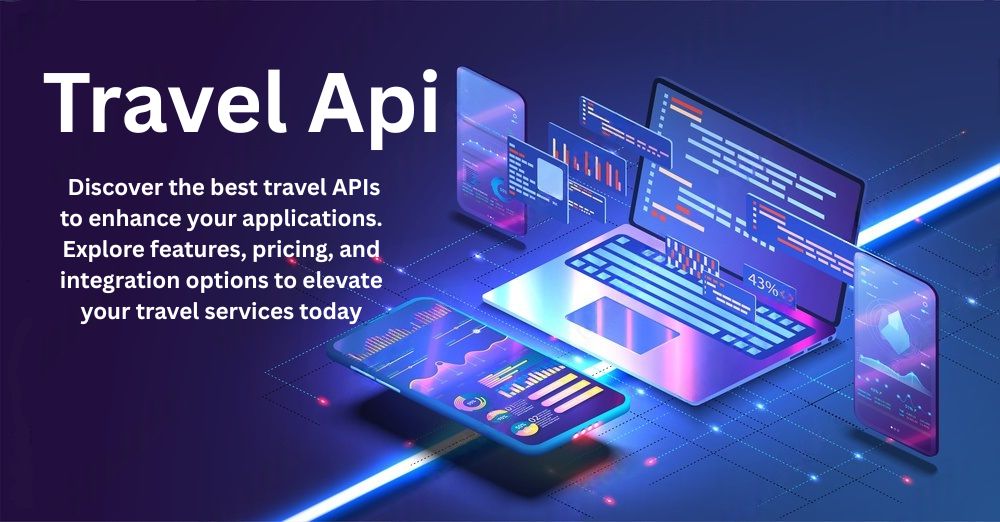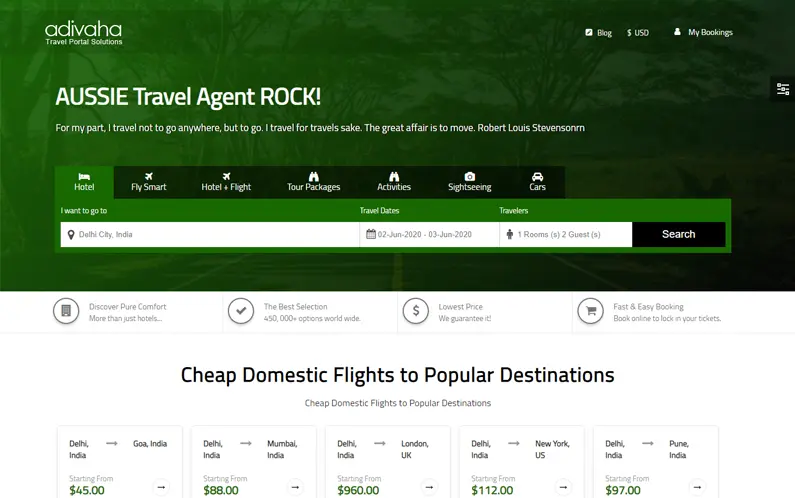Ready to go-LIVE travel solutions that helps your travel agency to sell a range of travel services pretty instantly. adivaha® travel solutions make sure you have no boundation over your imagination, you can do everything online, without the need for any technical knowledge or design skills. Easy Backoffice, extensive reporting with integrated Funds Management System.
New Boost Your Booking Site with the best Travel APIs
In the fast-changing world of digital travel, Best Travel APIs have emerged as the backbone of hassle-free booking websites and intelligent travel solutions. These APIs (Application Programming Interfaces) enable travel companies to integrate with suppliers and services such as flights, hotels, cars, buses, and activities in real time. If you're a new startup or an old OTA, travel APIs minimize manual efforts, speed up things, and improve the user experience. Selecting the best travel APIs is essential for scalability, automation, and profitability in today's travel environment.
What is Best Travel APIs?
A Travel API refers to a collection of web services that enables travel agencies, booking sites, and software systems to retrieve and consolidate travel-related information such as availability of flights, hotel rates, car rentals, and travel insurance from third-party providers. The Best Travel APIs provide extensive content, robust uptime, easy integration, and scalability. They facilitate automated bookings, inventory management, dynamic pricing retrieval, and post-booking services. Choosing the appropriate travel api is key to creating a competitive, user-centric, and revenue-generating platform within a fiercely competitive digital environment.
What are Travel APIs and why are they important?
Travel Booking APIs are electronic interfaces linking travel agencies to external providers such as airlines, hotels, and tour operators. They provide real-time access to inventory, price, and booking capability. Travel APIs are crucial for companies looking to automate services, decrease overhead, and provide an improved customer experience. Agencies would have to work with manual bookings and outdated information in the absence of APIs, creating inefficiencies. The Transportation APIs make operations simpler and provide a competitive advantage via superior connectivity and automation.
 New Boost Your Booking Site with the best Travel APIs
New Boost Your Booking Site with the best Travel APIsHow does the best travel APIs improve customer experience?
The top travel APIs enhance customer experience through real-time availability, correct pricing, and quicker bookings. With search filters, booking flexibility, and cancellation support, customers have a smooth and transparent experience. Travel APIs also enable platforms to personalize travel services, present rich content, and offer multiple suggestions in one go. The outcome is greater customer satisfaction, less booking abandonment, and greater repeat bookings, all fueled by the API's capability of accessing dynamic, accurate data on demand.
What should you look for when choosing a travel API provider?
When selecting a Travel API, look for aspects such as content coverage (flight, hotel, bus, etc.), performance, support for integration, documentation, and cost. Also, review the reputation of the provider, uptime guarantee, and scalability features. Optimal travel apis includes developer-friendly docs, specialized support teams, and live updates. Verifying whether the API supports post-booking, multi-currency, and multi-language services is also very important.. An optimal travel API improves both technical performance and business operations.
Flight Booking API
The Flight Booking API enables travel portals to incorporate global airline inventories into their platforms. It is capable of supporting live flights, searches, bookings, cancellations, seat reservations, and ticketing. The top travel apis for flights are provided by sources such as Amadeus, Sabre, and Travel port, which provide access to both the GDS and LCCs (Low-Cost Carriers). Flight APIs allow agencies to sell domestic and international air tickets with real-time prices and availability. Through this integration, users get instant bookings, dynamic filters, and a broad selection of carriers without ever departing the travel site.
Hotel Booking API
A Hotel Booking API integrates travel websites with thousands of hotel suppliers and aggregators around the world. This API offers information such as hotel descriptions, amenities, photos, room availability in real-time, rates, and instant confirmation. Best hotel APIs are those of Expedia, Agoda, and Hotel beds. These APIs enable users to book accommodations with ease and enable businesses to charge markups and handle commissions. Using the best hotel API enhances booking flexibility, raises inventory diversity, and guarantees greater customer conversion through rich content and a simple booking experience..
Bus Booking API
The Bus Booking API provides access to domestic and local bus operators, enabling customers to search for routes, seat availability, price, and schedules. It is best suited for Tier-II and Tier-III city-focused platforms in countries such as India. Redubs API and Bitla API are the top providers. These APIs also provide support for seat maps, boarding/dropping point choices, and canceling tickets. For companies, it streamlines the entire booking process and broadens their service range. The top travel APIs guarantee route precision, real-time bookings, and scalability by location.
Car Rental API
A Car Rental API enables the users to search, compare, and book car rentals in real time. It offers access to stock from international suppliers such as Hertz, Avis, and local aggregators. Customers can select cars according to pick up point, travel time, car category, and price range. The most suitable travel APIs for car rentals supports multi-city booking, cancellation, and insurance. For travel agencies, car rental API integration enhances cross-selling, increases services, and develops one-stop travel. It facilitates smooth bookings with minimal technical complexity.
Benefits
Real-Time Inventory and Pricing
Best APIs for travel booking offer real-time inventory and price feeds for flights, hotels, vehicles, and beyond. This guarantees that users are always provided with up-to-date information, minimizing errors in bookings and maximizing confidence. Travel businesses can provide dynamic prices, flash sales, and last-minute purchases with live API feeds. This is timelier, enhancing the user experience and generating more sales by providing only legitimate and bookable journeys with accurate prices and availability.
Scalability and Automation
Travel Technology APIs automate complex operations like bookings, cancellations, and inventory updates. They eliminate manual processes, allowing businesses to scale operations efficiently. APIs manage it seamlessly whether you're increasing the volume of bookings or adding new suppliers.. The White Label Travel APIs also support white-label solutions, agent management, and B2B distribution, enabling travel businesses to expand without rebuilding infrastructure. Automation and scalability together reduce costs and boost operational efficiency.
Major Features
Multi-Service Integration
The most effective Travel Service APIs enable multiple services - flights, hotels, buses, cars, and packages-to be integrated via one interface. Such an integrated approach renders separate supplier partnerships unnecessary, providing a single-window solution. Development becomes easier and maintenance is minimized, particularly for OTAs and tour operators. A multi-service API enhances the booking experience and revenue generation through cross-selling on one platform.
Multi-Currency & Language Support
Leading travel APIs provide multi-currency and multi-language support, which allows global travel platforms to localize content for various markets. This is critical for companies that cater to international users or work across different regions. Currency exchange, date formats in the local style, and labels in the user's language facilitate easier booking by customers. This feature improves user experience, minimizes confusion, and allows platforms to grow globally with less effort.

Services
White Label Travel Portal Integration
White label travel API services provide pre-built, customizable travel portals that embed APIs directly on your domain. For businesses without an internal development team, the services are perfect.. The portal comes with booking engines for flights, hotels, and others, including support for payment gateways and agent dashboards. This service assists travel agencies in getting started quickly with a professional front-end and robust backend fueled by the most superior travel APIs.
Custom API Development & Support
Custom API development and technical support services are provided by many providers. They consist of API mapping, custom filters, supplier integrations, and post-launch maintenance. From integrating specialty inventory to creating a custom booking flow, custom development provides your travel platform with tailored solutions. Support consists of bug fixes, API updates, and uptime monitoring, keeping your business running 24/7..
Packages
Starter API Package
For small travel startups and agencies, the Starter API Package features access to basic services such as flight and hotel APIs with restricted transactions. It generally incorporates basic integration support, test environments, and access to chosen suppliers. It's cost-effective and meant to enable companies to get started fast with core features. It's ideal for trial runs before going large.
Enterprise API Package
Designed for high-volume OTAs and B2B travel companies, the Enterprise API Package includes full access to multi-service APIs, unlimited transactions, advanced reporting tools, and priority support. It often includes integration with GDSs, consolidators, and direct suppliers. The packages offers dedicated account managers, real-time inventory updates, and complete white-label customization. It's built for businesses aiming for scalability, automation, and global expansion.
The Travel API integration for websites are revolutionizing the way contemporary travel agencies function by streamlining processes, facilitating real-time bookings, and enhancing user experience overall. Be it flights and hotels or buses and car rentals, high-quality APIs integrated across agencies cut operational costs while boosting revenues. With functionalities such as multi-currency support, tailor-made services, and scalable infrastructure, these APIs form the backbone of future-proofed travel platforms. Whether you are a startup company or an enterprise, your growth, innovation, and eventual success in the digital travel market depend on investing in the correct travel API.


